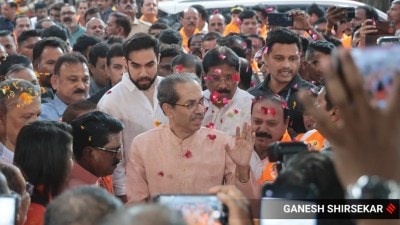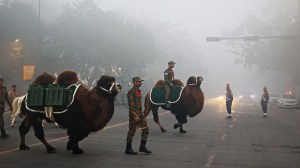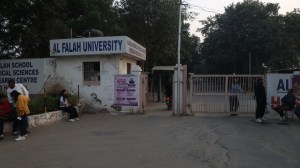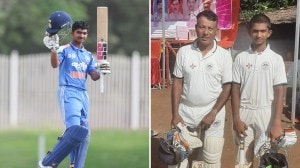Local waves
This may be an election for the Lok Sabha but in the south the vote may be decided more by local state factors and by local leaders. In Tami...

This may be an election for the Lok Sabha but in the south the vote may be decided more by local state factors and by local leaders. In Tamil Nadu, the fight between Vajpayee and Sonia seems a long way away. It8217;s all about Jayalalithaa versus her long-time opponent K. Karunanidhi. And next door in Karnataka, because of the simultaneous Assembly elections, S.M. Krishna and his record will affect voters. It8217;s no different in Andhra Pradesh where local factors with help decide 8212; both who gets the most seats in the Lok Sabha and whether Chandrababu Naidu wins a third consecutive term as Chief Minister.
According to the survey in Tamil Nadu, the ruling Chief Minister is facing a strong anti-incumbency wave. Her overall rating is a poor 20 per cent 8212; the lowest in the country 8212; and well below the national average for chief minister8217;s average of 47 per cent.
The reason for the strong anti-incumbency is Jayalalithaa8217;s poor scorecard on issues that matter to voters. The survey shows that voters rate her performance as 8216;8216;bad8217;8217; at handling the Cauvery water issue, 8216;8216;worse8217;8217; on the arrest of Vaiko under POTA, 8216;8216;bad8217;8217; on the law she introduced to make conversions difficult and an overall 92 per cent say it8217;s been a bad year for farmers.
With such a record, the BJP may regret its decision to tie up with Jayalalithaa, especially since the survey shows that far above the national average of 42, majority of voters 8212; a 51 per cent 8212; base their vote on local state factors.
In the final analysis, the opinion poll points to a landslide for the DMK-Congress combine. Out of 39 seats, they could be heading towards 34, a gain of 21 since the last elections while Jayalalithaa8217;s AIADMK and the BJP currently lag behind with just 5 seats 8212; down 21 since 1999.
But Jayalalithaa can take comfort from the fact that opinion polls in the state have had a poor track record with a history of errors, suggesting that the Tamil voter8217;s mind is among the most difficult to read in the country.
Karnataka
| nbsp; |
Naidu on a song,
Amma faces music |
||||
| nbsp; |
8226; ANDHRA PRADESH 8226; KARNATAKA 8226; KERALA 8226; TAMIL NADU |
nbsp; | |||
In the neighbouring state of Karnataka, the politically sensitive voter is once again making a clear distinction between his Lok Sabha and state Assembly vote. They8217;ve done it before in 1986 when they voted in Hegde as chief minister after voting strongly against his party just six months earlier in the Lok Sabha elections. This time, the vote-splitting helps the BJP in the Lok Sabha. They have a clear seven per cent lead over the Congress. But for the Assembly, the voter8217;s choice is S.M. Krishna who, at the moment, has a slender two per cent lead to come back as Chief Minister. Krishna is also clearly in the lead as the best Chief Minister. His 44 per cent rating is far ahead of the BJP8217;s man, Ananth Kumar, who gets only a 25 per cent.
According to the Nielsen survey, the major factors in Karnataka this time are the caste trends. There is a clear swing of Lingayats in favour of the BJP. The Vokkaliggas are split evenly between the Congress, the BJP and Deve Gowda8217;s party, all getting about 30 per cent each, with the Dalit and the Muslim vote still strongly in favour of the Congress.
The combination of Krishna8217;s relatively positive image and the divided caste loyalties suggests that the Congress is currently most likely to form the next government but it has only a narrow edge over the BJP and there is still a long way to go.
The reason why the BJP appears to be doing well in Karnataka8217;s Lok Sabha vote is the widespread 8216;8216;feelgood8217;8217; factor in the state 8212; a high 63 per cent say they 8216;8216;feel good8217;8217; 8212; above the national average of 55 pc.
And the Karnataka voter makes a clear distinction between the Lok Sabha and the Assembly vote. Seventy-four per cent say their Lok Sabha vote will be dominated by national factors and not local issues. As a result of the feelgood factor about the Centre, the BJP leads in the Lok Sabha seats. Of the 28 seats in the state, the BJP is leading in 21 8212; a gain of 11 since 1999. The Congress is trailing with just five seats and Deve Gowda could pick up at least two seats. But traditionally polls have tended to underestimate Deve Gowda in the past.
Andhra Pradesh
In Andhra Pradesh, the simultaneous Assembly and Lok Sabha elections may be affected by a whole new issue and the strong emotions generated by the Telangana Rashtra Samiti8217;s TRS8217;s demand for Telangana as a separate state, a demand supported by the Congress but opposed by Chandrababu Naidu and his allies, the BJP. Telangana accounts for 15 Lok Sabha seats which is about one-third of the 42 seats in the state which makes the non-Telangana area is much bigger with 27 seats.
The voters in Andhra are sharply divided on whether or not to support an independent state of Telangana. In the Telangana region, 63 per cent are in favour of an independent state but in the rest of the state, Naidu may benefit from a huge majority of 86 per cent who oppose the break-up.
The Nielsen survey points to both national as well as local state factors benefitting the Telugu Desam-BJP alliance here. The feel good factor was a high 63 per cent throughout the state and Chandrababu Naidu8217;s rating as Chief Minister, at 54 per cent, is still remarkably high despite his nine years in power.
But the two highly publicised Naidu policies evoked different reactions from the voters. A clear majority of 60 per cent feel that computers have not helped the common person in the state but the Janam Bhumi policy appears to have been successful with 62 per cent of the voters saying it has benefited the people.
The final outcome of all these opposing trends points to a clear lead for Chandrababu Naidu8217;s Telugu Desam with 34 Lok Sabha seats 8212; a loss of only two seats since the last time 8212; and seven seats for the Congress. Similarly, the Telugu Desam has an edge in the Assembly elections.
The danger ahead for the Telugu Desam and the hope for the Congress is that the TRS movement was at early stages when this poll was taken. The TRS did not even have a symbol at the time and there is a possibility that the Telangana movement may grow between now and the time of voting 8212; a factor that can only be captured in later opinion polls.
Kerala
In Kerala, Chief Minister A.K. Antony has faced an embarrassing public display of internal divisions within his Congress and this has hurt his image. Antony has a poor rating of 27 per cent 8212; well below the national average for all Chief Ministers of 47 per cent 8212; which puts him near the lowest of all CMs.
But the Congress will be relieved that these local factors do not dominate the Kerala voter8217;s Lok Sabha decision. National factors account for 62 per cent of their Lok Sabha vote.
Because of the narrow victory margins, Kerala is a difficult state to estimate for pollsters. But the Nielsen survey suggests a tilt in favour of the Congress-led UDF which is leading in about 14 seats compared with six for the CPM-led Left and Democratic front. The BJP does not feature strongly at all.
- 01
- 02
- 03
- 04
- 05































